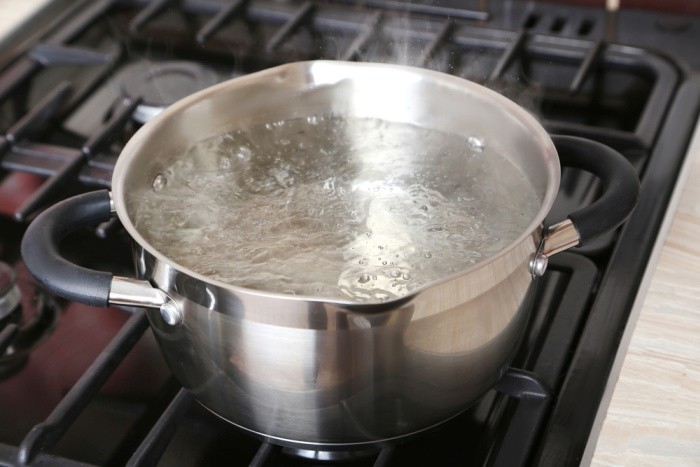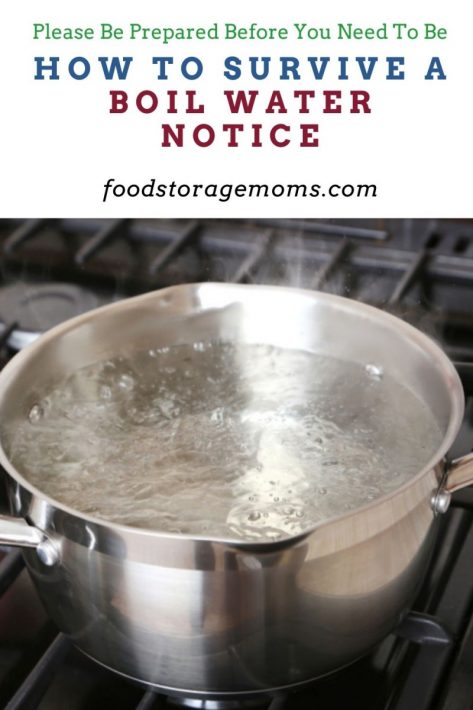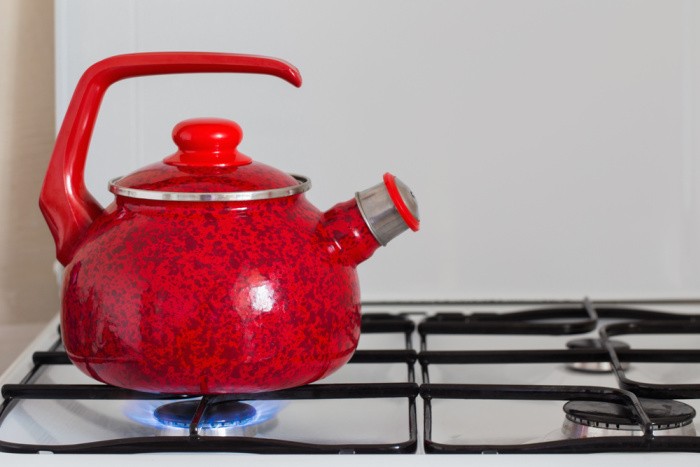
This may surprise you, but boil water notices happen in the United States more than you may think. Should your area ever experience one and you choose to ignore your local officials’ warnings and advisories, someone in your family could end up very sick. Some people have never experienced a boil water notice before and may not know what to do. I’m here to give you a few pointers on surviving a boil water notice if your community ever faces one.
What is a Boil Water Notice?
A boil water notice will be issued when a local health agency or a municipal water supplier discovers pathogens in their area’s water supply and they issue a boil water advisory as a result. Those pathogens could be anything detected, like Cryptosporidium, E. coli, Giardia, and more. But those aren’t the only reasons for a boil water notice. This can happen when there is a main water break, severe weather, flooding, or evidence of lead in the water.
A boil water notice could last anywhere from a couple of hours to several weeks or months. While many people can wait around to hear about it on the news, you do have access to this information on your local municipal water company’s website. There, you will find their procedures for such an event, including whether the company will issue information promptly by text, email, social media, or on their website.

How to Survive a Boil Water Notice
Now that you have a better understanding of what a boil notice is, the best way to survive one is for you and your family to prepare for it before it happens. During a contaminated water situation, you may or may not be told what is exactly wrong with your tap water. That’s why you must listen closely to what they say about what you can and cannot use your tap water for during this time.
They should provide specifics, such as not being safe for drinking, ice-making, or cooking. If they go a step further and tell you that your tap water shouldn’t be used for laundry or bathing, you will know that your water is unsafe for you to even touch. When this is the case, I’d encourage you to just go ahead and shut off your home’s main water valve so someone in the home doesn’t remember the notice or chooses to ignore it.
If you don’t have a way to boil water if your electricity or natural gas is cut off, consider getting a Butane Stove. I bought one for all four daughters to boil water or cook a meal after a disaster.
Boil Your Water

When there is a boil water notice issued for your area, you’ll need to boil tap water before you can do any of the following:
- Drinking water
- Brushing teeth
- Cooking/making drinks
- Making baby formula
- Making new ice
- Giving your pets water
- Rinse dishes or utensils
First, check if it’s so cloudy you can’t boil the water properly. If it is, you’ll need to use a coffee filter, paper towel, or clean cloth, or commercial water filters to help filter out the sediments. You’ll then need to put your water on the stove and bring it to a rolling boil for at least 1 minute. This should kill any bacteria or other pathogens in your water. If you live at a higher elevation of more than 6,500 feet, allow the water to boil for a minimum of 3 minutes. Allow your water to cool before using or storing it.
If the advisory indicates your water has lead in it, the boiling process won’t help. If the water advisory indicates the water has lead in it you should consider using commercial water filters like you find from Big Berkey and PortaWell. We have a reverse osmosis water filter system in our kitchen that we use as a cooking and drinking water source. We love having it available all the time so we don’t have to worry about those water quality issues.
Stock Up on Bottled Water
During a boil water issue, your number one concern should be making sure that your family stays hydrated. You will need to stock up on enough bottled water to drink, cook, and possibly bathe with. To better understand how much to stock up on, pay close attention to how much water everyone in your home uses over the next week. Use that consumption information to calculate what may be needed for a few days, a week, or longer.
If you’re simply looking for a rough estimate, seven packages of 40-pack bottled water should last a family of four for about a week. Hopefully, this gives you a better idea of how much water you should store if you’re thinking about having more than a week’s supply. If you have a baby that drinks formula, you’ll need to take that into consideration as well. Don’t forget your pets; they’ll need fresh water as well.
My readers are well aware that I stress the need to have safe stored water. I suggest you have four gallons per person per day to cover proper hydration, cooking, personal hygiene, and very limited laundry chores.
Use The Water You Have Stored
By now, you know, this is why we store water for our family. We never know when our water may become tainted, contaminated, or shut off. Please stock 4 gallons of daily water per person for each family member. Yes, this may seem excessive, but I get thirsty just thinking about 1 gallon per day, as some government agencies and The American Red Cross suggested. It’s all about being prepared. In case you missed this post, How To Store Water-Pros And Cons
Use the Water from Your Water Heater
If your situation lasts longer and all your local grocery stores are completely out of stock of water, you will need to find a backup solution to hold you over. As it turns out, your water heater may store close to 30-50 gallons in it. That will provide some relief. Here’s how to use the water stored in your water heater. Note: If you’ve been running water through the heater BEFORE you heard about the need to boil, it may be too late to use it right out of the heater itself unless you boil it first.
Please keep in mind that I never count on my water heater water, just in case we have an unexpected situation where our city/county water may become contaminated. I’m not talking just about terrorist attacks, I’m talking about errors made by city water employees connecting water lines, broken water mains, etc. It has happened several times over the last few years in Utah!
Here is one: Sandy, Utah Water. This one still makes me worried: Syracuse, Utah Water. And here is yet another one: Magna, Utah Water. I’ve told you before that I will not drink city water right out of the tap, I have reverse osmosis as mentioned above. I highly recommend getting a system installed. If you are handy with plumbing, you can install one yourself. Remember that these systems come in various terms of effectiveness and may not remove metal contaminants. Check the list from the manufacturer of things it removes to have the best protection possible.
Maintenance is done once a year, cleaning out the tubes and installing new cartridges. I spend $150.00 yearly to have mine cleaned, serviced, and filter cartridges replaced. Mine is hooked to my kitchen sink, so I use it for drinking and cooking. I know Costco sells them, possibly Sam’s Club. Mine looks just like this one: Reverse Osmosis Unit. They do not use electricity, they are water-pressure-driven.
We have all heard about the Flint, Michigan, nightmare. That situation is so sad for all the families involved. Flint Michigan Water
Stock Up on Bathing/Baby Wipes
If you have to use the water supply from your water heater for drinking, etc., you won’t be using it to take showers. That’s why I’d encourage you to have no-rinse bathing wipes to help keep your family clean and deodorized. Baby wipes are another option you could use.
Consider Staying with Friends or Family
Don’t wait around until your situation becomes desperate, because you shouldn’t have to. As long as you have friends or family living outside of the boil water notice, I’m sure someone would be willing to take your family in until your area’s water situation improves. If not, you could rent a hotel room or Airbnb accomodation as a last resort.
Set Family Rules During Boil Notice Days
If you have kids or grandchildren running around your house during this time, things can become a bit more difficult. After all, young children are accustomed to turning on the faucet to grab a drink or wash their hands anytime they want. You’ll have to enforce a few household rules during a boil water notice to keep everyone safe. These are a few simple ones anyone could follow:
- Drink only bottled water
- Avoid using any faucet (put a sticky note on the handle of every faucet if you have to)
- Use bottled water to brush your teeth and wash your face
- Instead of using soap and water, use hand sanitizer for hand washing
Does Turning Water to Ice Kill the Water Contaminants?
Don’t think that the ice from your ice maker and ice dispenser will be safe to use. Cold doesn’t protect you like a heat source does. Water advisories never state that you should use the ice from your ice makers. Even ice in ice trays that have been in the freezer for weeks isn’t safe. To ensure proper water quality, you need to follow the instructions outlined throughout this post!
When I Use My Dish Washer to Wash Dishes Am I Safe?
Your dishwasher is designed for dishwashing, not water sanitization. Yes, if you use the “sanitize” cycle the hot water will kill most bacteria since the water generally is set to be over 150 degrees as the final rinse temperature. However, many heat-resistant viruses and fungi can tolerate those temperatures. That’s why boiling is the best answer.
Can I Use Bleach to Make My Water Safe for Drinking and Cooking?
The CDC suggests you use 1/8 teaspoon of unscented chlorine bleach for each gallon of water to be treated. Even though it’s unscented, I’ve never been fond of the flavor of water treated with bleach. I use a product called WaterPreserver to treat my large containers of stored water. The treatment lasts five years instead of six months for water treated with unscented bleach, so it’s a much more efficient option.
Final Word
When you’re not completely sure whether your water is safe, be sure to use more caution. Boiling your water or having bottled water on hand is a great way to ensure that no one in your family gets sick. What tips can you give on how to survive a boil water notice? May God Bless this world, Linda.
Other Content to Check Out:
Water is the Number One Thing We Need to Survive
Why You Need Emergency Water Storage
How to Calculate Your Water Needs for Survival
Copyright Images: Tea Kettle with Boiling Water Deposit photos_82816484_s-2019, Boiling Water Deposit photos_133082290_s-2019
The post How to Survive a Boil Water Notice appeared first on Food Storage Moms.
from Food Storage Moms
No comments:
Post a Comment